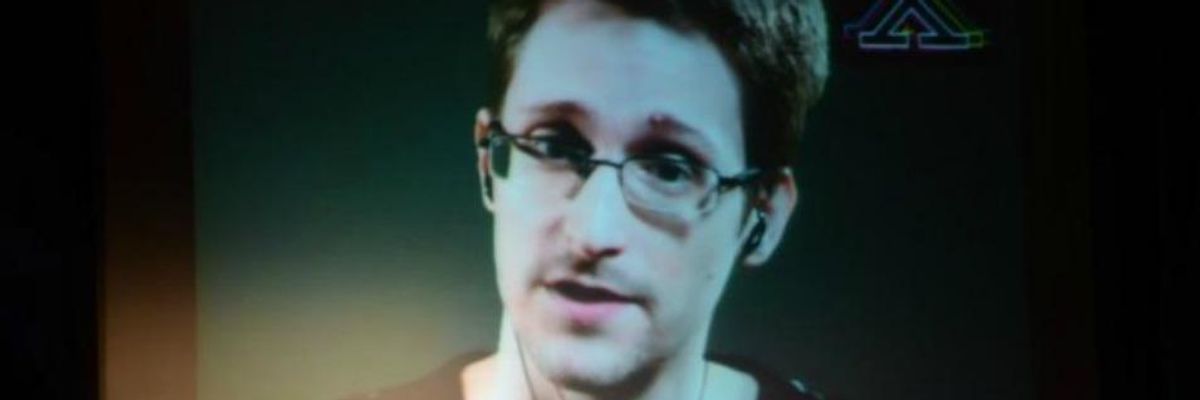Sharing the stage today with a video feed of Edward Snowden, Pentagon Papers leaker Daniel Ellsberg noted that the new generation of whistleblowers has improved his reputation. Government officials and others seeking to discredit Snowden and Chelsea Manning have claimed Ellsberg's historic leak as more legitimate than, and somehow different in kind from, the leaks of the new generation. Ellsberg of course rejected such claims as ridiculous and intentionally misleading. He emphasized the similarities, and also cited all sorts of ways in which the recent leaks have been even more daring than his.
In the course of their conversation, however, differences between the two figures did emerge, and maybe those differences say something about the rest of us.
"Technology enables dissent," Snowden postulated at the start of the dialogue, which took place at the tenth Hackers on Planet Earth conference, or HOPE X, in New York City. He warned against the tendency to "sleepwalk into new protocols, into new applications" and implored the geek-heavy audience to "encode our rights into the protocols you write." He also called for hackers to help "shift the ground of technical literacy" in society as a whole, promoting more widespread adoption of such practices as public-key cryptography. "We don't want a high priesthood of technology."
Although Snowden pointed out that technology played an important part in Daniel Ellsberg's 1971 leak -- the technology of the photocopier -- Ellsberg himself didn't focus on that part of the story. "I have less optimism about technology than you have," he said. The word he used again and again was risk. He meant human risk, human choice. He spoke of the sense of solidarity he felt with Manning and Snowden when he saw the risks to comfort and safety they were willing to take for truth. What motivated Ellsberg to take his own risk, by his account, was less to spread information or even enforce the Constitution than to end what he saw as a horrendous moral evil: the Vietnam War.
Just as Snowden claimed Ellsberg as an influence, Ellsberg found common cause with his inheritors today. He made a lengthy and passionate speech denouncing the ongoing evils of the modern U.S. security regime, and calling on more people in the security services to take risks and speak out. "A lot of blood has flowed because people bit their tongues or swallowed their whistles," he cried.
When the floor turned to Snowden after that, he fell quiet at first. "I'm still politically pretty moderate," he began by saying. (He'd earlier described his political philosophy as "almost Stallman-esque," referring to the anti-copyright, free-software advocate Richard Stallman.) He stressed that he doesn't blame fellow contractors who haven't followed his lead; rather, he put the burden on the hundreds of hackers in the room to create tools that will make whistleblowing easier and safer. Whereas Ellsberg spoke of resistance as a matter of moral urgency and heroic choice, Snowden saw it as an engineering challenge.
Maybe the difference between these two is a matter of personalities, or of life circumstances. But I wonder if it might also in some respects be a matter of generations. I wonder if there is some respect in which a more thoroughly computerized society is one in which information politics passes for politics as a whole, in which it's harder for us to notice the importance of human agency -- including one's own.
Near the end of the conversation, Snowden lost his train of thought. "I have a really short working memory," he said, and attributed the lapse, at least half-joking, to "a lifetime of memes and lolcats."
"What can I say? I'm a child of the Internet."
